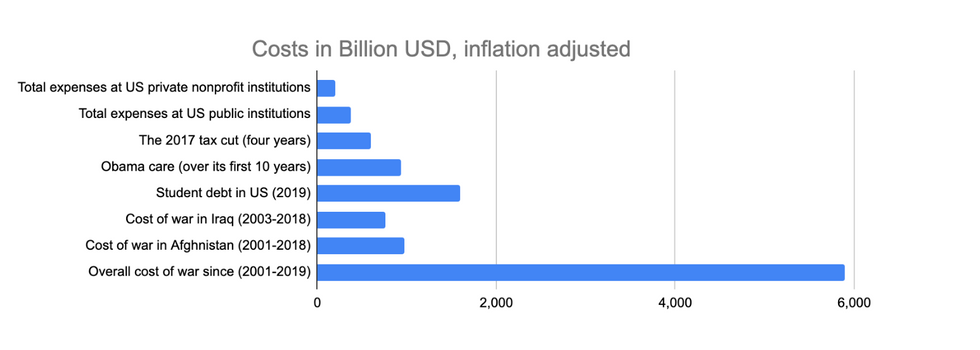In the aftermath of September 11, almost everyone was convinced that a quick and powerful military response would teach them an unforgettable lesson. We thought this would prevent future threats to our homeland and ultimately make the world a better place.
We were wrong.
The ensuing American military campaigns in the Middle East proved themselves to be costly mistakes with many unintended consequences. What began as an isolated counterinsurgency in Afghanistan quickly spread to Iraq, Libya, Syria, and most recently, Yemen. And for the trillions of dollars the United States spends engaging in its so-called "war on terror,” it is rewarded with more extremism, poverty, and spiralling death tolls across the increasingly destabilized Middle East.
If stability and democracy were the goals, neither were ever achieved.
If we want lasting peace and prosperity for other nations (rather than short-lived military victories), we need to help these countries grow. Put simply, we should spend less on advancing drone warfare and more on building schools.
Although the costs of war have been heavily criticized, it still raises eyebrows when compared to some recent controversial policy issues at home. Consider the following figure that shows multiple legislative items and their respective costs.
First, notice the cost of war. Recent estimates of the total cost of the wars (since 2001) is around $5.9 trillion, based on expenditures from the U.S. Treasury and future commitments (including the medical and disability claims of U.S. war veterans). This cost is several orders of magnitude greater than any other internal policy issue (for instance, it is 6 times the cost of the 10-year Obamacare plan and 15 times the annual cost of public education in the U.S.). The wars in Iraq and Afghanistan have cost American taxpayers at least $757 billion and $975 billion respectively. The two sums are more than enough to cancel out all student debt — a promise made by several 2020 presidential contenders.
In addition to the obvious military costs, there are many hidden costs for our many missed opportunities, the chance of investing war dollars in alternative sectors and to tackle the problems in radically different ways to create a much more prosperous future for the people of these countries. Unfortunately, prosperity was never an intention.
For perspective, consider the annual costs for education in Iraq and Afghanistan relative to American military spending in the figure below. The United States’ annual military expenditure dwarfs the investments of each country toward their respective education systems. Imagine if the United States chose to dedicate part of its military budget toward securing access to education for the millions of children (1.2 million Iraqi and 3.7 million Afghan children) who have yet to step inside of a classroom and are most vulnerable to recruitment and radicalization.
Suppose the United States chose to prioritize a non-military intervention over warfare in its quest to counter the influence of the Taliban and al-Qaeda? Imagine an alternative world where, instead of relying on troops unfamiliar with the multifaceted societies of Afghanistan and Iraq, we empowered their citizens: by investing in their infrastructure, hospitals and schools; financing educational programs, and creating incentives for trade.
It is in the interest of the United States (and other world powers) to help build a prosperous Middle East; A prosperity that allows all citizens, not just the wealthy few, to have access to education, to be connected to the world, and trade freely is good for us all.
If we want to cultivate a culture of tolerance, we must facilitate interactions between our cultures. Entrepreneurs in Baghdad and Gaza should be encouraged to trade and connect with businesspeople based out of New York and Tel Aviv. By harnessing these opportunities to communicate, we can work toward achieving understanding and mutual respect.
Unfortunately, we have taken several steps backwards by creating divisions, applying sanctions, and making trade more difficult. In an environment that embraces an us vs. them mindset, tolerance is easily abandoned.
The United States is harming itself and the people of other countries by creating an endless cycle of violence. Instead of making us safer, this addiction to warfare leaves our own society in danger by sowing resentment abroad. While war does little to prevent terrorism, empowering societies suffering from the influence of radicalization can help eradicate it.


















